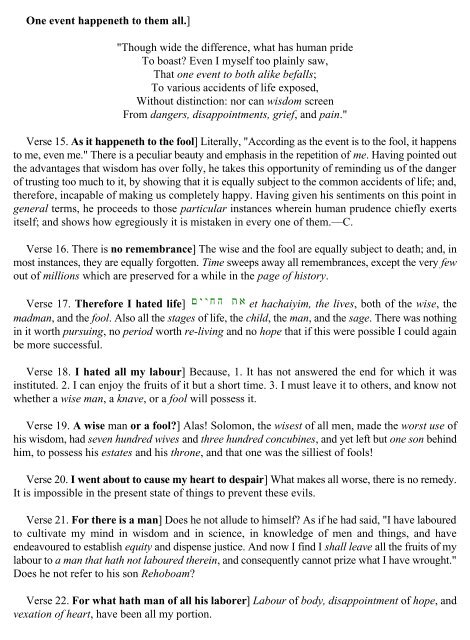Clarke's Commentary - Proverbs - Song Of ... - Media Sabda Org
Clarke's Commentary - Proverbs - Song Of ... - Media Sabda Org
Clarke's Commentary - Proverbs - Song Of ... - Media Sabda Org
You also want an ePaper? Increase the reach of your titles
YUMPU automatically turns print PDFs into web optimized ePapers that Google loves.
One event happeneth to them all.]<br />
"Though wide the difference, what has human pride<br />
To boast? Even I myself too plainly saw,<br />
That one event to both alike befalls;<br />
To various accidents of life exposed,<br />
Without distinction: nor can wisdom screen<br />
From dangers, disappointments, grief, and pain."<br />
Verse 15. As it happeneth to the fool] Literally, "According as the event is to the fool, it happens<br />
to me, even me." There is a peculiar beauty and emphasis in the repetition of me. Having pointed out<br />
the advantages that wisdom has over folly, he takes this opportunity of reminding us of the danger<br />
of trusting too much to it, by showing that it is equally subject to the common accidents of life; and,<br />
therefore, incapable of making us completely happy. Having given his sentiments on this point in<br />
general terms, he proceeds to those particular instances wherein human prudence chiefly exerts<br />
itself; and shows how egregiously it is mistaken in every one of them.—C.<br />
Verse 16. There is no remembrance] The wise and the fool are equally subject to death; and, in<br />
most instances, they are equally forgotten. Time sweeps away all remembrances, except the very few<br />
out of millions which are preserved for a while in the page of history.<br />
Verse 17. Therefore I hated life] et hachaiyim, the lives, both of the wise, the<br />
madman, and the fool. Also all the stages of life, the child, the man, and the sage. There was nothing<br />
in it worth pursuing, no period worth re-living and no hope that if this were possible I could again<br />
be more successful.<br />
Verse 18. I hated all my labour] Because, 1. It has not answered the end for which it was<br />
instituted. 2. I can enjoy the fruits of it but a short time. 3. I must leave it to others, and know not<br />
whether a wise man, a knave, or a fool will possess it.<br />
Verse 19. A wise man or a fool?] Alas! Solomon, the wisest of all men, made the worst use of<br />
his wisdom, had seven hundred wives and three hundred concubines, and yet left but one son behind<br />
him, to possess his estates and his throne, and that one was the silliest of fools!<br />
Verse 20. I went about to cause my heart to despair] What makes all worse, there is no remedy.<br />
It is impossible in the present state of things to prevent these evils.<br />
Verse 21. For there is a man] Does he not allude to himself? As if he had said, "I have laboured<br />
to cultivate my mind in wisdom and in science, in knowledge of men and things, and have<br />
endeavoured to establish equity and dispense justice. And now I find I shall leave all the fruits of my<br />
labour to a man that hath not laboured therein, and consequently cannot prize what I have wrought."<br />
Does he not refer to his son Rehoboam?<br />
Verse 22. For what hath man of all his laborer] Labour of body, disappointment of hope, and<br />
vexation of heart, have been all my portion.
















